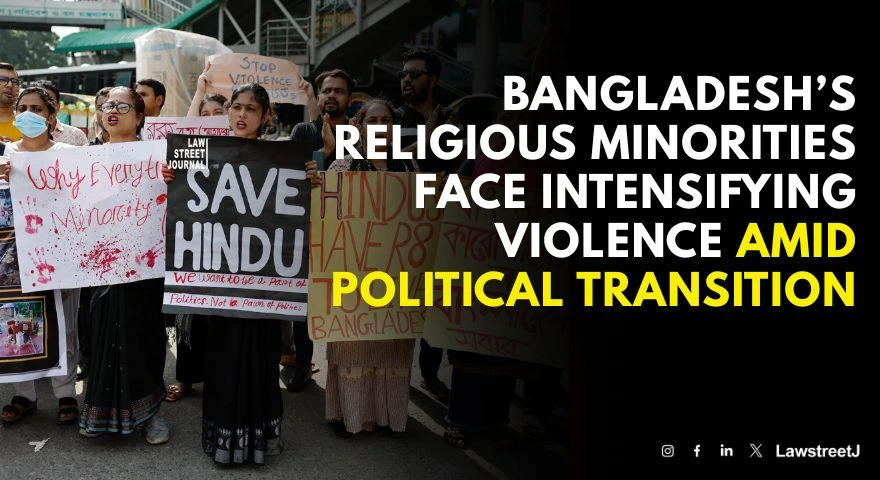Bangladesh: Over 258 attacks on Hindus, Buddhists, and Christians in 2025; 27 deaths, 20 sexual assaults, and 59 temple desecrations reported; government admits 134 cases but faces criticism over inaction.
Bangladesh has witnessed a sharp rise in communal violence targeting Hindus, Buddhists, and Christians amid political instability following the ouster of Prime Minister Sheikh Hasina in mid-2024. Data compiled by the Bangladesh Hindu Bouddha Christian Oikya Parishad (BHBCOP) shows 258 incidents of violence in the first half of 2025. These include 27 murders, 20 incidents of sexual violence, 59 attacks on religious sites, 87 attacks on homes and businesses, 12 cases of property occupation, and 21 arrests or torture incidents linked to blasphemy allegations.
Rural districts such as Sunamganj, Dinajpur, Barisal, and Khulna have been worst affected. Eyewitnesses reported mobs attacking homes and religious structures following rumors or blasphemy accusations. In one case, Krishna Das, a Hindu farmer from Monglargaon, stated that his house was burned after a young Hindu man in the area was accused of blasphemy. The Bangladesh Hindu Buddhist Christian Unity Council (BHBCUC) earlier recorded 174 attacks and 23 deaths between August and December 2024, indicating a continuing pattern of targeted hostility against minorities. Local rights groups describe the violence as organized and widespread rather than isolated.
Legal and Institutional Breakdown
Despite constitutional guarantees, protection for religious minorities remains inconsistent. Article 28 prohibits religious discrimination and Article 41 ensures religious freedom, yet enforcement remains weak. The Special Powers Act, 1974—intended for national security—has reportedly been misused to detain minority activists rather than perpetrators.
The interim government led by Chief Advisor Professor Muhammad Yunus acknowledged receiving 134 formal complaints of communal violence between August 2024 and January 2025. However, rights organizations argue the data severely underrepresents the real scale. The Human Rights Congress for Bangladesh Minorities (HRCBM) recently submitted a complaint regarding temple desecration in Dinajpur, citing “institutionalized fear” and “inadequate police action.”
The Minority Rights Commission, established in 2023 to address discrimination, has not yet released its 2024 report. Legal experts warn that without fast-track tribunals, independent investigations, and police accountability mechanisms, justice for victims will remain elusive.
International Scrutiny and Humanitarian Concerns
The continuing attacks have drawn international attention. The UN Human Rights Office, Amnesty International, and Human Rights Watch have urged Dhaka to protect religious minorities. The UN has reminded Bangladesh of its obligations under the ICCPR and CERD. India’s Ministry of External Affairs confirmed raising concerns with Dhaka in Parliament regarding temple vandalism and harassment of minority citizens, though no concrete assurances have been announced yet.
Humanitarian groups report widespread displacement, destruction of property, and loss of livelihoods. Many affected families have relocated to urban areas for safety. Religious sites—including temples and churches—have suffered significant damage, deepening fear within minority communities.
Human rights observers highlight delays in investigations, limited prosecutions, and inadequate victim-protection mechanisms. Security forces have been criticized for failing to prevent mob attacks despite prior alerts. Political uncertainty since 2024 has intensified communal tensions, allowing local disputes to escalate into targeted violence. While security has been increased in some districts, civil society reports that victims still face pressure to withdraw complaints.
The absence of updated Minority Rights Commission data and delayed release of the 2024 human rights report have raised transparency concerns. Legal analysts emphasize the urgent need for judicial reforms, structured hate-crime documentation, and international cooperation to ensure accountability. With more than 250 recorded attacks and 27 deaths in 2025 alone, the violence against Hindus, Buddhists, and Christians represents a deepening governance and human-rights crisis. Effective enforcement of constitutional guarantees and impartial investigations are essential to restore confidence and uphold rule of law in Bangladesh.


![Governor can't keep Bills pending indefinitely: Supreme Court [Read Judgment]](/secure/uploads/2023/11/lj_5620_Governor_cant_keep_Bills_pending.jpg)
![Supreme Court refuses pre arrest bail to IPS officer accused of creating fake WhatsApp account of HC's CJ [Read Order]](/secure/uploads/2023/11/lj_1575_Fake_WhatsApp_account_of_Patna_HC_Chief.jpg)
!['Automatic lifting of stay in all cases after 6-month,' Supreme Court's 5-judge bench to reconsider its 2018 judgment [Read Order]](/secure/uploads/2023/12/lj_9484_Automatic_lifting_of_stay_in_all_cases.jpg)
![Supreme Court forms 5-judge bench to examine 2018 judgement on automatic lifting of stay in all cases after 6-month [Read Notice]](/secure/uploads/2023/12/lj_8899_SC_automatic_vacation_of_stay.jpg)




